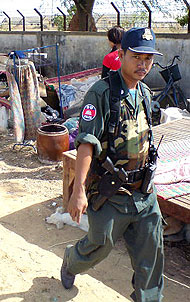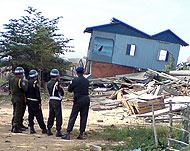Tear Gas and Gunfire During Latest Violent Eviction In Cambodia's Capital
Published on 28 February 2008Early on the morning of 22 February, 2008, more than 100 heavily-armed military police, intervention police and district police officers violently and forcibly evicted 23 households in Banla S'et village, Khmuonh commune, Russey Keo district, Phnom Penh. As a result, four villagers were injured and eight were detained, leaving behind a dismantled community with nowhere to go.
The eviction was carried out less than 24 hours after the community received notice of eviction. Military and police forces arrived shortly after 7.30am, and less than five minutes later, fired two tear gas canisters at residents while simultaneously shooting dozens of AK-47 bullets into the air, in a blatant attempt to intimidate and force the community to leave. Many bullets were also fired directly at a nearby vehicle, which subsequently exploded.
Authorities then used two mechanical excavators to quickly tear down the community's 23 concrete and wooden houses. A small number of families were allowed to enter their homes to collect their belongings before they were demolished. None of the affected families have been given compensation for the loss of their houses and possessions, nor have they been provided with alternative housing.
During the incident, four villagers were injured from beatings by the police, including one woman who sustained a serious head injury. A further eight people were detained by the authorities. Following negotiations by NGOs at the scene, four detainees were released later that day, and the remaining four were released the following day.
All 23 families maintain that they built their houses and settled their community around 1994 and have been living peacefully on the site since then. Local authorities have recognised their occupation of the land and granted family books and other relevant documents. In 2005, two businessmen claimed ownership of the land and went to court seeking the residents' eviction. Eventually, the Supreme Court upheld the businessmen's claim and decided to authorise the eviction.
Unlawful use of weapons

An Intervention Police officer at latest Russey Keo's eviction site armed with tear gas gunDespite the Supreme Court's authorization, this was an illegal forced eviction because of the excessive use of force, the lack of compensation paid in advance to the victims for their demolished homes and belongings, and the fact that they have been rendered homeless. Each of these acts is a violation of international law.
The excessive use of force by the authorities, and in particular the dozens of bullets fired by them, violated Cambodian and international law1. The United Nations Basic Principles on the Use of Force and Firearms by Law Enforcement Officials states that "Law enforcement officials, in carrying out their duty, shall, as far as possible, apply non-violent means before resorting to the use of force and firearms. They may use force and firearms only if other means remain ineffective or without any promise of achieving the intended result." In this eviction, the police and military police involved did not attempt to use non-violent means before resorting to the shooting of bullets and tear gas.
This eviction is just one of many in Cambodia in recent years in which excessive violence is used, sometimes with deadly consequences.
"The deaths of two unarmed civilians during a brutal eviction in Preah Vihear province in November 2007 shows what can happen in these situations," said Naly Pilorge, director of LICADHO. "Unless the government wants the same thing to happen again, in other provinces and in the middle of Phnom Penh, it needs to radically change the way that it deals with land disputes."
LICADHO reiterates its call for the Royal Government of Cambodia to immediately impose a moratorium on all involuntary evictions until a legal framework that respects human rights is in place. LICADHO also calls for the Royal Government of Cambodia to stop denying that forced evictions are occurring in Cambodia
- Topics
- Land Rights
- Related








